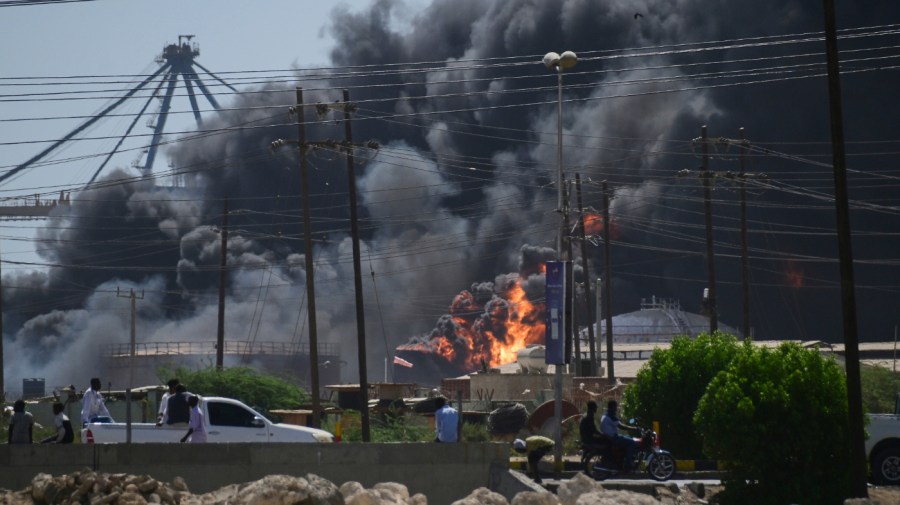World
Trump’s Role in Preventing Genocide in Sudan Amid Crisis

The situation in Sudan has deteriorated significantly, leading to an urgent need for international intervention to prevent genocide. Reports indicate that ongoing violence, particularly in the Darfur region, has escalated since late 2021, resulting in thousands of deaths and displacements. With the United States facing a critical juncture under the leadership of Donald Trump, the question arises: how can the U.S. play a pivotal role in preventing further atrocities?
The global landscape for intervention in Sudan is more challenging than it was in early 2022. The United Nations has continuously urged member states to take decisive action, yet the options available are limited. The complex geopolitical dynamics, coupled with the diminishing influence of the U.S. in the region, exacerbate the crisis. As reports suggest, the lack of a robust international response has left millions vulnerable.
Current Challenges and Humanitarian Impact
The humanitarian crisis in Sudan is staggering. According to the United Nations Office for the Coordination of Humanitarian Affairs, approximately 19 million people in Sudan are in need of assistance. This includes access to food, clean water, and medical care. The violence has particularly affected vulnerable populations, including women and children, who bear the brunt of the conflict’s consequences.
Efforts by the African Union and other regional entities have made some progress, but their capacity to respond effectively is hindered by limited resources and political instability within Sudan itself. As the situation worsens, the international community must reconsider its strategies to address the escalating violence.
Potential Actions for the United States
For the U.S. to take a proactive stance, several measures could be considered. Diplomatic engagement remains a primary avenue. Strengthening ties with regional allies and leveraging relationships with the International Criminal Court could facilitate accountability for perpetrators of violence. Furthermore, a coordinated response involving humanitarian aid and sanctions against key figures in the Sudanese government may help to mitigate the crisis.
Additionally, the U.S. could enhance its support for grassroots organizations working to provide aid and promote peace within Sudan. Engaging with local leaders and communities can create sustainable pathways for conflict resolution and reconciliation efforts.
While the path forward is fraught with challenges, the urgency of the situation cannot be overstated. The international community, particularly the United States, must act decisively to prevent a full-scale genocide in Sudan. The consequences of inaction could be catastrophic, not only for the Sudanese people but also for regional stability.
In conclusion, the potential for genocide in Sudan demands immediate attention. With effective leadership and collaborative efforts, the U.S. can contribute to alleviating the humanitarian crisis and protecting innocent lives. As history has shown, timely intervention can make a significant difference in preventing atrocity crimes. The time for decisive action is now.
-

 Top Stories4 weeks ago
Top Stories4 weeks agoNew ‘Star Trek: Voyager’ Game Demo Released, Players Test Limits
-

 World4 weeks ago
World4 weeks agoGlobal Air Forces Ranked by Annual Defense Budgets in 2025
-

 World1 month ago
World1 month agoMass Production of F-35 Fighter Jet Drives Down Costs
-

 World1 month ago
World1 month agoElectrification Challenges Demand Advanced Multiphysics Modeling
-

 Science1 month ago
Science1 month agoTime Crystals Revolutionize Quantum Computing Potential
-

 Business1 month ago
Business1 month agoGold Investment Surge: Top Mutual Funds and ETF Alternatives
-

 Entertainment1 month ago
Entertainment1 month agoFreeport Art Gallery Transforms Waste into Creative Masterpieces
-

 Top Stories1 month ago
Top Stories1 month agoDirecTV to Launch AI-Driven Ads with User Likenesses in 2026
-

 Lifestyle4 weeks ago
Lifestyle4 weeks agoDiscover Reese Witherspoon’s Chic Dining Room Style for Under $25
-

 Health4 weeks ago
Health4 weeks agoGavin Newsom Critiques Trump’s Health and National Guard Plans
-

 Business4 weeks ago
Business4 weeks agoUS Government Denies Coal Lease Bid, Impacting Industry Revival Efforts
-

 Lifestyle4 weeks ago
Lifestyle4 weeks agoLia Thomas Honored with ‘Voice of Inspiration’ Award at Dodgers Event









